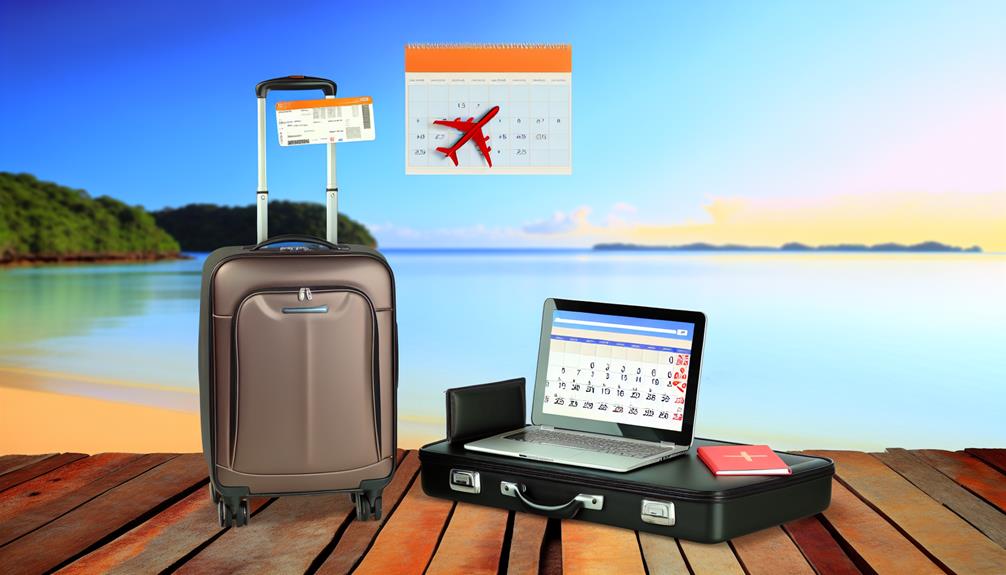To get coverage for trip cancellations, start by understanding your options in trip cancellation insurance. Look for policies that cover unforeseen circumstances like illness or severe weather. You can choose standalone options or extensive travel insurance, including the CFAR (Cancel For Any Reason) coverage for added flexibility. Compare quotes from travel insurance companies, airlines, or credit card providers, and make sure to review the policy details for exclusions. Gather necessary receipts for nonrefundable expenses to strengthen your claim. By knowing these key elements, you can effectively safeguard your travel plans and investments. There's much more to explore about how to protect your trips.
Key Takeaways
- Purchase trip cancellation insurance through travel insurance companies, airlines, or credit card providers for coverage on nonrefundable expenses.
- Consider standalone policies or comprehensive travel insurance, including options like CFAR for greater flexibility.
- Compare quotes from multiple providers to find the best rates and coverage tailored to your needs.
- Review policy details thoroughly to understand exclusions, limitations, and coverage limits before purchasing.
- Keep organized records and receipts of nonrefundable expenses to streamline the claims process if cancellation occurs.
Understanding Trip Cancellation Insurance
When planning a trip, understanding trip cancellation insurance can save you from significant losses if unexpected events arise. This type of insurance typically provides reimbursement for prepaid nonrefundable expenses, covering up to 100% of your costs for unforeseen circumstances like illness or severe weather. You can choose from various coverage options, including standalone policies or extensive travel insurance. If you want greater flexibility, consider the Cancel for Any Reason (CFAR) option, which allows you to cancel your trip and still receive up to 75% reimbursement if you notify the provider at least 48 hours in advance.
When selecting trip cancellation insurance, it's important to review the policy details thoroughly. Be aware of common exclusions, such as foreseeable events or pre-existing medical conditions, which can affect your financial protection. To guarantee the best coverage for your needs, compare quotes from multiple travel insurance providers and consider factors like your age and trip length. Finally, keep all documentation for claims organized, as having the right paperwork will help streamline the process if you need to file a claim. This proactive approach can help you travel with peace of mind.
Coverage Details
Trip cancellation insurance provides vital coverage for nonrefundable travel expenses, ensuring you're financially protected if unexpected events disrupt your plans. This insurance typically covers valid reasons for trip cancellation, such as serious illness or injury, the death of a traveling companion or immediate family member, severe weather, and legal obligations like jury duty. Most travel insurance policies offer reimbursement for prepaid expenses, covering up to 100% of your trip costs, while some extensive plans may even provide up to 150% reimbursement for additional expenses incurred.
If you want more flexibility, consider adding "Cancel for Any Reason" (CFAR) coverage to your policy. This optional feature allows you to cancel for any reason and receive up to 75% reimbursement, as long as you cancel at least 48 hours before your departure. However, it's important to review the specific coverage details and exclusions listed in the policy, as many plans exclude pre-existing conditions and foreseeable events. By understanding these coverage details, you can make informed decisions and protect your travel investment effectively.
Exclusions and Limitations

Understanding the exclusions and limitations of trip cancellation insurance is essential for making informed decisions about your travel protection. Many policies exclude coverage for foreseeable events, like announced airline strikes or named storms, so it's important to be aware of these exclusions before purchasing. In addition, if you have pre-existing medical conditions, be prepared for the possibility that any related illness or injury may not be covered, potentially leading to denied claims.
Cancellations stemming from personal choice or dissatisfaction with travel arrangements usually aren't eligible for reimbursement under most policies. This means if you change your mind about your trip, you might be out of luck. Moreover, employment-related reasons, such as voluntary job changes or scheduling conflicts, typically fall under limitations that exclude them from coverage.
It's critical to carefully review the policy details to understand what qualifies as a covered event. Events like self-harm, acts of war, and participation in high-risk activities are commonly excluded. By familiarizing yourself with these exclusions and limitations, you can better navigate your trip cancellation insurance, ensuring you're prepared for unforeseen circumstances.
Cost of Trip Cancellation Insurance
While planning your getaway, it's important to take into account the cost of trip cancellation insurance, which typically ranges from 4% to 6% of your total trip cost. For example, if your trip costs $5,000, you could expect an insurance premium of about $200. Basic trip cancellation insurance policies often start around $131, while thorough coverage may run up to $291, depending on the benefits included.
If you're considering the "Cancel for Any Reason" (CFAR) option, be prepared for an additional 50% charge on the total insurance cost. This option allows reimbursement of up to 75% of your prepaid trip costs, offering greater flexibility.
Keep in mind that several factors influence insurance rates, including your age, trip length, and destination. Older travelers might face higher premiums due to increased health risks. For instance, insuring a $3,000 trip could cost between $60 and $180, while a $7,000 trip might range from $280 to $420. Evaluating the cost of trip cancellation insurance upfront can help you protect your investment and enjoy peace of mind during your travels.
How to Purchase Insurance

When you're ready to secure your trip cancellation insurance, there are several avenues to explore. You can purchase trip cancellation coverage through travel insurance companies, airlines, or credit card providers, often receiving online quotes in minutes.
It's essential to compare quotes from multiple providers to guarantee you get the best rates and coverage options tailored to your trip. Check out the table below to understand the key aspects of trip cancellation insurance:
| Coverage Option | Description |
|---|---|
| Extensive Trip Insurance | Covers nonrefundable expenses and more |
| Cancel for Any Reason Coverage | Up to 75% reimbursement for any cancellation |
| Insurance Cost | Typically 4% to 10% of trip cost |
| Policy Details | Review exclusions and coverage limits |
Before purchasing, gather your receipts for nonrefundable expenses and review the trip cancellation policy details. This helps you understand the coverage limits and makes sure you're aware of any exclusions. If you want extra flexibility, consider adding Cancel for Any Reason coverage for an additional cost. This way, you'll be better prepared for unexpected changes in your travel plans.
Filing a Claim
Filing a claim for trip cancellation insurance can be straightforward if you follow the necessary steps. First, you need to notify the insurance company within 72 hours of your cancellation decision to kick off the process. Gather the necessary documentation, which includes proof of cancellation reason, your travel reservations, and receipts for any non-refundable expenses incurred before cancellation.
Next, you'll want to submit your claim online using the insurance provider's designated claims form. This guarantees efficient processing of your request. Be sure to document all costs that aren't refunded by travel suppliers, as this information is vital for reimbursement for prepaid expenses.
If you're seeking claims for additional benefits, remember that these must typically be incurred within 180 days of the cancellation. So, keep all related receipts and records organized to facilitate your claim. By staying proactive and organized, you can navigate the claims process smoothly and increase your chances of receiving the reimbursement you're entitled to. Stay on top of your documentation, and you'll make filing your claim a breeze!
Distinction Between Cancellation and Interruption

Understanding the difference between trip cancellation and trip interruption insurance is essential for any traveler. Knowing these distinctions can help you choose the right coverage and avoid unexpected financial losses. Here are four key points to take into account:
- Trip Cancellation Insurance: Covers non-refundable trip costs if you cancel before departure due to unforeseen events.
- Trip Interruption Insurance: Covers additional expenses and non-refundable costs if your trip is disrupted after you've already started it.
- Cancellation Policies: Typically reimburse 100% of insured trip costs for covered reasons, while interruption coverage compensates for unused prepaid expenses.
- Coverage Limits: Each policy has its own terms and conditions, so it's important to understand what's included.
Frequently Asked Questions
Can I Get Just Trip Cancellation Insurance?
Yes, you can get just trip cancellation insurance. Many providers offer it as a stand-alone policy, allowing you to cover nonrefundable travel expenses in case of cancellations. The cost usually ranges from 4% to 10% of your total trip cost, depending on various factors. Make sure to review the policy details carefully, as exclusions and limitations may apply. Choosing a dedicated policy can give you tailored protection for your specific travel situation.
Can I Get Travel Insurance to Cover Cancellation?
Yes, you can get travel insurance to cover cancellations. Many extensive policies include this, or you can opt for standalone trip cancellation insurance. Coverage usually reimburses non-refundable expenses if you cancel for specific reasons like illness or severe weather. You might also consider a "Cancel for Any Reason" option for extra flexibility. Just be sure to compare different policies, so you find the best coverage for your needs and understand any limitations.
Does Travel Insurance Cover Trip Cancellation?
Yes, travel insurance typically covers trip cancellations due to unforeseen events like serious illness, injury, or severe weather. You can get reimbursed for nonrefundable expenses, but coverage varies by policy. If you want more flexibility, consider the "Cancel for Any Reason" option, which allows you to cancel for any reason and receive partial reimbursement. Always review your policy's terms to understand what's included and what documentation you'll need for claims.
What Is Considered a Covered Reason for Trip Cancellation?
When considering what's a covered reason for trip cancellation, you'll find several valid scenarios. Serious injuries or medical conditions that prevent you from traveling, confirmed by a physician, are typically included. You might also qualify if you or a close family member passes away. Other factors like severe weather, strikes, unexpected legal obligations, or unforeseen events like terrorism affecting your destination can also warrant coverage. Always check your specific policy for details!
